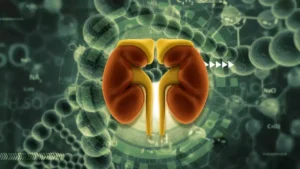Can HMPV Impact Kidney Function? Key Signs and Symptoms to Look For

As the respiratory illness season begins, the relatively lesser-known Human Metapneumovirus (HMPV) is raising concerns due to its increasing prevalence in China and other parts of the world, including India. While some fear it might trigger another pandemic because of its similarities to Covid-19, experts reassure that there is no need to panic about its rapid spread. HMPV typically causes mild flu-like symptoms, such as fever, cough, nasal congestion, and difficulty breathing. However, it can lead to severe complications in vulnerable populations, including infants under 1 year, the elderly, and those who are immunocompromised.
What is Human Metapneumovirus (HMPV)?
HMPV is a respiratory virus primarily affecting the upper and lower respiratory tracts. It commonly results in symptoms like fever, cough, nasal congestion, and difficulty breathing.
Can HMPV Affect the Kidneys?
Many are curious if HMPV, similar to Covid-19, can affect other organs, including the kidneys. While there is limited evidence suggesting that the virus may have an indirect impact on the kidneys, experts, including nephrologists and pulmonologists, agree that further studies are needed to fully understand the virus’s potential effects on other organs.
Cytokine Storm and Its Impact on Kidney Function
“The kidneys play a crucial role in filtering waste and toxins from the body. During severe infections, when multiple systems are affected, the kidneys can be particularly vulnerable to damage. Although direct kidney involvement with HMPV is uncommon, the virus can trigger complications like a cytokine storm due to an intense immune response. This may impair kidney function. In most cases, kidney functions recover as the patient’s condition improves, but in some instances, patients may require dialysis,” explained Dr. Anuja Porwal, Director of Nephrology at Fortis Hospital, Noida, to TOI Lifestyle.
HMPV and Acute Kidney Injury
While HMPV infections typically lead to respiratory symptoms, they can also cause acute kidney injury (AKI) in certain patients. A study has established a link between the virus and kidney damage.
“There is some evidence suggesting an association between HMPV infection and renal issues, particularly acute kidney injury (AKI). A study involving hospitalized children in the United States found that HMPV infection may increase the risk of AKI. Although this study lends some credibility to the potential connection between HMPV infections and kidney diseases, more research is needed to fully understand this relationship,” stated Dr. Mohit Khirbat, Consultant in Nephrology at CK Birla Hospital, Gurugram.
Patients with pre-existing kidney conditions or those at higher risk for kidney issues are more susceptible to severe kidney involvement from HMPV, while in other cases, kidney involvement tends to be mild.
Signs and Symptoms of Kidney Issues with HMPV
If HMPV indirectly affects the kidneys, patients may display signs of kidney dysfunction. These symptoms include decreased urine output, swelling in the legs or face, fatigue, and confusion. Blood tests may reveal elevated levels of creatinine or urea. “If the HMPV virus affects the kidneys, symptoms like reduced urine output, facial puffiness, and leg swelling may occur. Kidney involvement can be detected through basic blood and urine tests, such as Serum Creatinine, blood urea, and a complete urine examination,” explains Dr. P S Vali, Senior Consultant Nephrologist and Head of the Department at the Asian Institute of Nephrology and Urology, Hyderabad.
While HMPV does not directly affect kidney cells, complications resulting from the infection can lead to kidney issues. For example:
•Dehydration caused by high fever or insufficient fluid intake can put stress on the kidneys.
•Sepsis, a severe infection affecting the entire body, can reduce blood flow to the kidneys, causing damage.
•Inflammation triggered by the immune response may interfere with kidney function.
Dr. Khirbat points out the kidney-related symptoms to watch for with HMPV infection:
•Decreased urine production, which could indicate impaired kidney function.
•Swelling, especially in the legs, ankles, or around the eyes, resulting from fluid retention due to weakened kidney function.
•Fatigue, which is common in both kidney dysfunction and HMPV infection.
•Shortness of breath, typically linked to the respiratory effects of HMPV but also a sign of fluid retention caused by renal impairment.
•Nausea and vomiting, which can sometimes be related to kidney issues.
To reduce the risk of kidney failure, Dr. Vali recommends the following tips:
•Stay well-hydrated by drinking plenty of fluids to prevent dehydration.
•Use painkillers cautiously; Paracetamol is a safer option for kidney health.
•Be alert for kidney symptoms such as reduced urine output, puffiness in the face, and swelling in the legs.








